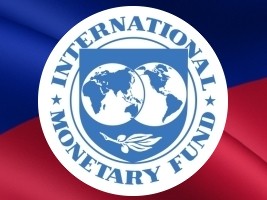|
||||||||||||||||||
| Download the revised decree and electoral calendar, published in the official journal |
|
|
Haiti - IMF : Assessment of the Haitian economy and recommendations 03/02/2020 08:33:07
The Executive Board of the International Monetary Fund (IMF) concluded the Article IV 2019 consultation with Haiti. Since March 2019, Haiti has been experiencing a protracted political crisis and prolonged civil unrest that has at times shut down most economic activity in the country. The crisis has taken a toll on the economy and the already vulnerable population: inflation exceeded 20% year-on-year in September https://www.haitilibre.com/en/news-29002-haiti-economy-inflation-inexorably-continues-its-rise.html , output is estimated to have contracted by an estimated 1.2% in fiscal year 2019 (ending September 30), and the exchange rate depreciated by 25% over the same period. As fiscal revenues have plummeted and the cost of energy subsidies increased, the fiscal deficit widened to 3.8% of GDP in FY2019 and domestic arrears rose sharply. The public debt-to-GDP ratio jumped from 40% to 47% over the fiscal year. The authorities are making considerable efforts to limit the deterioration. The ministry of finance is implementing measures to improve revenue collection and better control spending and, in November, signed a new agreement with the central bank to strengthen fiscal discipline and limit monetary financing of the government https://www.haitilibre.com/en/news-29375-haiti-flash-the-state-signs-an-economic-governance-pact-with-the-brh.html . The central bank has been adjusting its interest rates to contain inflation while at the same time trying to support the private sector through the recession. Absent sustained implementation of good policies and comprehensive reforms, the outlook remains grim. Under the baseline assumption of some political stabilization in 2020 without major political or economic reforms, growth would improve but remain negative this year and below 1.5% over the medium term. Inflation is expected to decline slightly before eventually falling to below 10% by 2025. Risks to the outlook are primarily on the downside but political stability could bring important upsides. A resolution of the current crisis, appointment of a new government committed and able to implement reforms, and return of support from the international community could lead to higher investment and potential growth. Executive Directors agreed with the thrust of the staff appraisal. They expressed concern about the socio‑political crisis in Haiti and stressed the urgency of restoring political and macroeconomic stability, addressing poverty and inequality, and tackling corruption. They called on all stakeholders to work toward a broad‑based national dialogue to address the country’s daunting challenges and realize the potential scope for much stronger and more inclusive growth. Directors encouraged continued close cooperation with donors and the Fund, including through technical assistance, and welcomed the Country Engagement Strategy as a basis for future Fund engagement. Directors stressed that severe fiscal constraints necessitate shifting scarce resources away from non‑priority spending toward social programs and investment. They underscored the importance of limiting monetary financing of fiscal deficits and preparing a notional budget for FY2020. Directors encouraged the authorities to focus on measures to boost domestic revenues and reduce exemptions in the near term, while working to strengthen tax administration, prepare a resolution plan for budget arrears, and bolster public financial management. Directors commended the authorities for progress on the new national plan for social protection, and stressed the need to advance its approval and focus on a limited number of cash transfer programs. Directors underscored the urgency of updating the anti‑corruption policy priorities https://www.haitilibre.com/en/news-29882-haiti-flash-haiti-12th-most-corrupt-country-out-of-180.html , including setting up the steering committee envisioned in the 2009 anti‑corruption strategy. They also stressed the need to enforce the asset declaration system https://www.haitilibre.com/en/news-29735-haiti-politic-ulcc-ultimatum-for-asset-declarations.html and conduct regular audits of state‑owned enterprises and other public entities. Directors encouraged the authorities to allow the exchange rate to adjust in an orderly fashion. Looking ahead, they recommended setting a quantitative monetary target, and encouraged the monetary authorities to advance other institutional reforms. Directors supported the central bank’s efforts to continue deepening financial intermediation and inclusion, including via fintech. Directors emphasized that well‑sequenced reform of the energy sector will be crucial for fiscal sustainability and higher growth and must be accompanied by clear communications and measures to offset the impact on vulnerable groups. They encouraged the authorities to overhaul the management and performance of EDH, work with stakeholders to reduce electricity costs, improve the reliability and efficiency of energy supply, and lower the related fiscal burden. Broader structural reforms are needed to improve the economy’s competitiveness, including efforts to streamline regulations, remove infrastructure bottlenecks, strengthen property rights, and enhance governance. Building resilience to natural disasters is also a priority. Directors urged the authorities to take steps to improve the quality and timeliness of economic data, with the help of further Fund technical assistance. See also : https://www.haitilibre.com/en/news-29841-haiti-flash-me-claudy-gassant-dg-of-ulcc-revoked.html https://www.haitilibre.com/en/news-29735-haiti-politic-ulcc-ultimatum-for-asset-declarations.html https://www.haitilibre.com/en/news-29882-haiti-flash-haiti-12th-most-corrupt-country-out-of-180.html HL/ HaitiLibre
|
|
|
Why HaitiLibre ? |
Contact us |
Français
Copyright © 2010 - 2026 Haitilibre.com |





